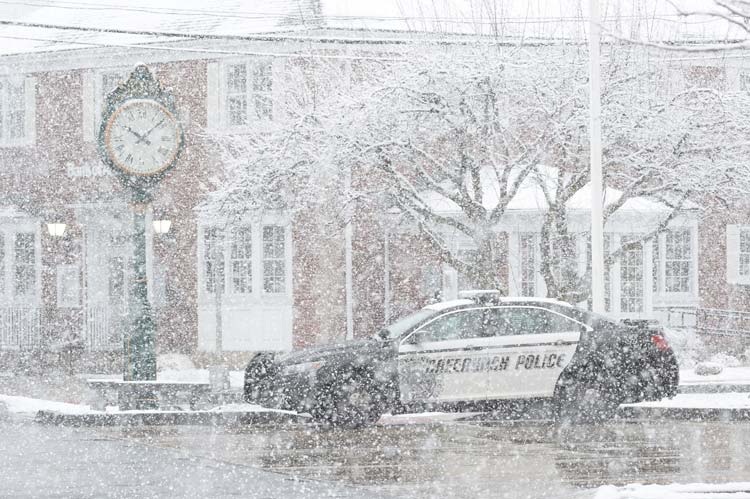By Liz Leamy and Elizabeth Barhydt
Greenwich Town Hall Fills to Hear Details of Budget and Housing Battles
A full room at Greenwich Town Hall on July 9 underscored the urgency residents feel about state policy choices. State Senator Ryan Fazio and State Representative Tina Courpas spent about 2 hours laying out the complex budget negotiations and the fierce fight over the omnibus housing bill known as HB 5002—while answering pointed questions about what comes next.
“It’s really just such a great honor to be up there and to represent this town, my hometown, for yet another legislative session in the Senate,” said Fazio as the evening opened. “There’s not a day that goes by up there that we don’t feel the immense privilege and honor to represent this great town and a responsibility to do it with the best of our ability.”
Guardrails Debate and Budget Concerns
Much of the discussion centered on Connecticut’s socalled budget “guardrails,” the fiscal caps enacted in 2017 to impose discipline on spending. Fazio warned that the new budget “significantly changed and I think therefore broke those budget guardrails.”
“It significantly lifted and changed that volatility cap to the tune of $600 million per year, meaning that we will probably be paying down $600 million of less debt every single year in the state when you have $90 billion of unfunded liabilities on the backs of taxpayers,” he said.
Courpas, serving in her first term, described her own reaction in stark terms: “From 2017 to the present, we’ve had a path. We have had a recovery path for Connecticut and we’ve been on it and it has really given us guardrails,” she said. “This is my first legislative session, but I could see the disappointment on the faces of people that have been there a long time. I don’t know where we are now because now that they’re broken, I don’t know where we go.”
The Housing Bill Veto and a “Temporary Victory”
But the most heated issue of the evening was HB 5002, the omnibus housing bill vetoed by Governor Lamont after an outcry from communities statewide.
Fazio did not mince words: “The most significant affront to local control of decision making, especially planning and zoning and housing that we’ve seen in this state in a generation.”
He described pressing the bill’s Senate champion during debate: “I asked her on the Senate floor during the debate if this was just a threat to diminish funding to the towns and cities or if she would rule out voting for a full mandate to take away local zoning in the future in order to achieve this development, she said she would not rule it out. She actually said, I don’t know.”
He credited local activism for changing the outcome: “Ultimately after two weeks of all of you and people like you all over the state sending messages, emails, calls, I know people who personally texted the governor and there was a veto one day before it would’ve gone into law.”
But Fazio warned the veto wasn’t the end of the matter. “Remember, it’s a temporary victory,” he said. “The governor and the legislative leadership promise that they would negotiate and bring us into a special session to pass something else, which in my mind will probably take away the fair share and maybe water down some of the parking requirements. That would be my guess if I had to make a prediction.”
He was even more direct later when pressed on the timeline and content of what’s next: “It’ll come sooner. The governor and the legislative leadership promised and has negotiated the fact that there will be a special session to pass some sort of housing legislation. My guess is my prediction, although it’s a really difficult prediction to make, is that 70 or 80% of what was in the bill will be passed into law. Maybe the fair share part will be rolled back or taken out. It’s still going to be a bad bill. It’s still going to be something that Tina and I almost certainly vote no on.”
Residents Speak Out with Thanks and Warnings
Throughout the evening, residents repeatedly stood up to thank the two legislators for their work—especially on HB 5002 and on defending local zoning control in the face of what one called an “overwhelming” majority in Hartford.
“First of all, thank you for all the work you guys are doing,” said one attendee. “It’s amazing. And also for the work to fight HB 5002.”
Another added: “Thank you again for both of you for 5002. Appreciate it.”
One resident underlined the challenge of resisting pressure from Hartford: “I just really want to thank you both for fighting the f ight to really protect local zoning and Greenwich, because what’s happening is they’re trying to take it away from us, and we know what’s best for Greenwich. So I know it must be really aggravating to really fight against the tide, but please continue to do that.”
One audience member also thanked them both while turning to local funding concerns: “Thank you both for what you’re doing. One of the things that your colleagues across the aisle take credit for is money’s back to Greenwich for school projects, et cetera. I think you and I know that it’s all formulaic and there’s really no extra money coming back is what’s due.”
Kelly Thompson, a Riverside resident who commutes to New York three days a week, offered particularly personal thanks: “As a PR person who works in New York three days of the week hearing this news about the tax bill is just, I mean music to my ears… I’d like to thank you both because as a PR person, I know it’s tough to get the positive press for all the work you’re doing. Tina, I have a 18-year-old who has learning disability and he grew up in the Greenwich School District for a while and we need someone like you who represents the voices of these children and their parents because for us, it wasn’t continual Madeline. It always was a challenge to make sure he was getting the best education he could. So thank you Ryan. Thank you for your work on the electricity bill, for the budget guardrails for all of that, but especially on the 5002.”
Another resident echoed the broader gratitude in the room: “I would also like to add my thanks to both of you. Thank you. Being here tonight to educate all of us and let us know what’s happening.”
Pressing for Clarity and Local Control
Questions turned to the work-live-ride provision in HB 5002 and its impact on neighborhoods near train stations. “What the legislation said is that currently that towns or cities would have to deliver a plan to the state government, to the state bureaucracy that would up zone areas around a bus or a train station,” Fazio explained. “Normally half a mile radius, half a mile radius. So actually you’re within that. Yes, because you’re a thousand feet or 2000 feet. And that up zone it to the point that there are up to 10 units. There could be up to 10 units per lot developed as of right or else the town or city loses priority for several buckets of state funding.”
Courpas warned of the bill’s broader implications: “One objection, and we’re trying to get this kind of conversation going, which is this is a very myopic view of the housing situation. We have supposedly, studies have said that we have a lack of 90,000 affordable units in Connecticut, but we have 4,000 homeless people roughly in Connecticut… So what about their incomes? To me, it’s the fact that people can’t afford the housing that we do have.”
Calls for Transparency in Hartford
Residents also challenged the process in Hartford, with one attendee asking for a law requiring time to review bills before votes. Fazio described his proposal: “I introduced a bill last year and again this year that would require any bill over 50 pages to be published 24 hours before it’s voted on by the full house or Senate, any bill over a hundred pages, 48 hours at minimum in public before it’s voted on.”
Courpas pointed to the reality of the current process: “It used to be the case that the budget could be dropped on you. The budget was 963 pages this year and there’s a law now in the legislature, a self-governing law, which says that the house has to have at least 12 hours to review the budget. So now it gets dropped at three o’clock in the morning.”
Closing the evening, Courpas offered a note of humility and thanks:
“Walking in that building every day and having in my mind the faces of the people in the 149th and knowing the responsibility of representing you was just an overwhelming privilege. So thank you and thank you also for the support and the constant inputs about issues that you care about and your expertise.”




